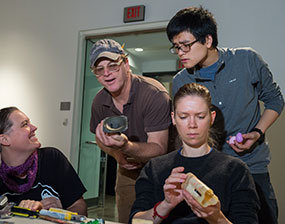“Who knew that so many new things could be made from junk?” said Fiona Adjei Boateng ’19, a theater student who was making handbags out of denim pants during an upcycling workshop.
Reet Aus, an Estonian fashion designer and environmental pioneer, hosted the workshop in Clifford Gallery. She is known for upcycling, which is using discarded materials to make beautiful new products. Aus was in residence at łÉČËÍ·Ěő for 10 days — a joint venture with the department, , , the , and .

Reet Aus (front) upcycles discarded materials into art. Photo by Mark DiOrio
During the workshop, students worked with Aus to transform materials sourced from the Madison County Solid Waste and Recycle facility as well as Syracuse Rescue Mission into usable objects or works of art. They created jewelry fashioned from used metal wire, wearable garments made from leftover cloth, and found art pieces.
In Aus’s lectures on campus and in the screening of her documentary, Out of Fashion, she explained that, to keep up with the fast pace of fashion trends, clothing companies use wasteful manufacturing practices to produce cheap garments. “On average, eighteen percent of the textiles processed in clothing factories are leftovers, and are thrown away,” she said in Golden Auditorium on November 2. These materials end up in landfills, which pollute the air, water, and soil.
“Working with Reet throughout the week was eye opening,” said Adjei Boateng, “I still can’t believe how much waste the clothing industry creates in the manufacturing process, and the impact that it has on the environment.”
To address the problem, Aus and her colleagues designed a software program and certification called Upmade that helps factories reduce waste by upcycling leftover fabric back into the production process. Two major factories in Estonia and Bangladesh have received the certification so far.
“Reet Aus is a true leader and planetary hero,” said John Pumilio, łÉČËÍ·Ěő’s director of sustainability. “She demonstrates how it’s possible to pursue our passions with social consciousness and environmental stewardship as a cornerstone.”
Upcycling goes beyond environmental concerns. Aus also addresses the social and moral implications of fast fashion, noted studio art major Kris Pfister ’17. Pfister’s senior art project uses recycled materials because Pfister was inspired by Aus. Pfister said: “Her work is a tangible force of resistance to the materialism the Western world has become so accustomed to.”
